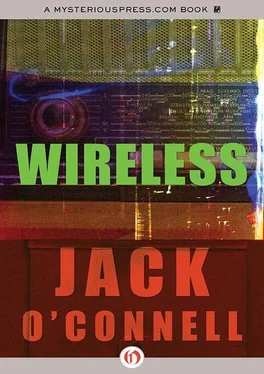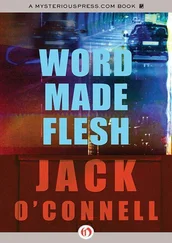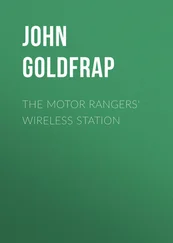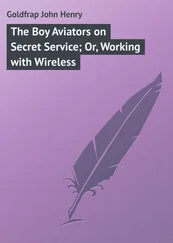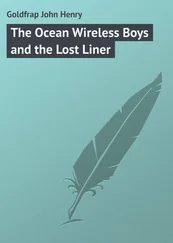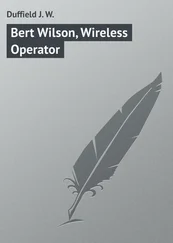The man shakes his head and the woman says, “We call him Bo at home.”
Flynn smiles, addresses the man, “Should I call you Bo? You tell me.”
Bo shrugs and mumbles, “Fine.”
The guy is uncomfortable, not someone used to this kind of meeting. Flynn is going to have to change that, adjust some of the pitch up front, make things familiar.
“Well, you can both call me G.T. My high school catcher hung that on me and it stuck.”
“Played ball?” Bo asks.
“Oh, yeah,” Flynn says, low voice, breaking eye contact momentarily as if embarrassed. “All the way through college.” He flinches but manages to hide it. “Anyway, I think you’ll both find there are no formalities in this office. Now, before we begin, can I get either one of you a refreshment? Cup of coffee or tea? Bo, I got a cold one back there, if you’d like.”
Bo shakes him off and Carol says, “We’re all set right now.”
“Okay, great, just let me know if you change your mind. Now”—he slides open a drawer and brings a manila folder up onto the desktop—“I’ve had a chance to look over your informational sheets here. I hope they weren’t too much of a bear to fill out.”
“They were no problem,” Bo says.
Bo could be tough. If things get too bad, he’ll refocus all his energy and pitch directly to Carol.
“That’s great. I’m telling you, some of the forms these days, I don’t know, the banks are the worst. Couple years back I went in for a car loan. Simple car loan, okay? It was like a trip to a blind dentist. You needed a degree from MIT just to fill out page one.”
“You looked over our papers?” Bo asks.
Flynn looks up from the desk, stares into Bo’s eyes. You can’t cajole this guy . He lets the smile drift off his lips. You can’t friendly this guy into signing the papers . He looks back down to the desk, takes a second, closes the folder. He looks up at Carol, over to Bo, back to Carol again. He changes strategy, fades into the tone of a legendary grammar school principal.
“Says here you have three children?”
“Three girls,” Carol says.
“Three girls, that’s wonderful. Terrific. You wouldn’t have a photo by any chance?”
It’s a dangerous play. Used to be a standard, but in this day and age, when you’ve got molesters pictured on the front page every other night, it’s risky. They could question your motives, get a little queasy.
Carol goes into her handbag, takes out the wallet, slips a color shot from a plastic sleeve, and hands it across the desk to him. Flynn starts a long, unblinking stare at the picture, like he’s trying to translate an ancient language. Then he starts to nod and asks, without looking up, without directing himself to either one of them, in a purposefully unfriendly voice, “How’d you two meet?”
Neither one was prepared for that question. They were both expecting something about the kids, a question about the girls’ ages, what schools they attended.
Bo says, “I, I …,” and Carol jumps in with, “High school. We were in the same class—”
Flynn cuts her off, his voice sucked clean of emotion, “So you’d both be the same age?”
“Bo’s a few months—”
“Approximately the same age? Born the same year?”
“The same year, yes, nineteen—”
“Any other dependents?”
There’s a pause. He assumes they’re looking at each other, one of them trying to come up with the nerve to just walk out. But he continues staring at the photo until Bo says, “Just the girls. Just the ones in the picture there.”
Flynn’s been waiting for Bo’s voice and it comes out just right — tentative, too unsure for anger or action. A little helpless.
In front of Flynn, at the top of the desk, is a heavy brass pen holder, an antique, a long flat base with the Flynn family crest engraved on it and two floutlike stems that jut up and can pivot on a secured ball bearing. He reaches out and grabs the piece, turns it around with one hand so that the two Mont Blancs point out toward Bo and Carol. Then, delicately, he places the picture of the three girls in front, leans it against the pens like a small easel, so the faces of the children beam up at the parents.
He comes forward in his seat, rests his weight on his arms and elbows, seems to push his upper body toward them.
In a low voice, the voice of some anguished last-century minister, he says, “I want five minutes of your time to tell you a story. You’re not beholden to me at all. If there’s some reason you’re no longer interested in my services, then you’re free to go. I don’t require an explanation or an apology. But I’d like to give you this story to keep. A little token of this night. Okay? No matter what happens after you leave, if we never see one another again, all right, I want you to hear this story. Will you do that?”
They do what he wants. They nod rather than answer.
He takes a deep breath, like an Olympic swimmer about to leap from his pedestal. And he begins.
“All right, then. This is about a man with a lot of ambition. Great tenacity. What you and I would most likely consider a good man. He makes a family early in life, cares for them to the best of his ability. I look at you. I study the two of you. I see you understand this man’s motivations. You share his sense of what is and is not important in this life. Let’s name the things. Let’s say them and judge them. Fame? No, I don’t think so. Luxury? No, unnecessary. Status? No, empty, subjective. Power? No. Travel? Adventure? Simple no. Family? …” A slight pause. “Okay, all right. Family. Correct? Kin. Blood. The love and caring of man, woman, child. Yes? I think so. You have to choose what to make an effort for. You’re given so many years. You don’t even know how many. It’s a gamble. The average man gets what? What is it today? I’m no actuary, but it’s coming in around seventy-two years. Little more for the women. That’s the average. Do you get more? Less? There’s only one person who knows that. He’s not telling. Not on this earth, he’s not. So you make the choice. Whether you know it or not, you weigh the alternatives. The different avenues of this lifetime. Independence, self-interest, no worry. You’re young at some point. You say, ‘I could be in the Caribbean, I could sail chartered catamarans, live in a shack, sleep in the sun half the day.’ You say, maybe, ‘Vegas, Learn to be a blackjack dealer. Different showgirl every night,’ huh? You say, ‘I’m a beautiful young girl, fresh out of high school, I’ll go to New York, take the stage by storm, champagne and flowers in the dressing room,’ huh? I don’t think so. You made the choices. Like the man in the story, you took the route — husband, wife, family. You found the job. You found the house. You raced to the hospital, four A.M., the contractions coming faster, the water breaking on the cart into maternity, the pain. You brought her home. Look at the picture there, people, you brought the little girl home. It begins. Number two, number three. Days pass, you clean the house, you buy the used cars, you go to parents’ night. Hamburger Helper twice a week, so what? The guys from high school, all getting together, going fishing, beautiful lake, upstate New York — uh-uh, no can do, sorry, guys. You get the legal pad out, late at night, April, tax time, Carson’s in the background, your mate’s asleep in the easy chair, you can hear the breathing. You’ve walked down the hall, looked in their bedroom, checked to make sure the covers are pulled up, no bad dreams or stomachaches. You go back to the legal pad. You start a list, things that will come up, no question, orthodontist bills, piano lessons, maybe a second car when the first one gets the license, God help us. You play with numbers. You rearrange things, try to figure the best case and the worst. The promotion comes through. The promotion does not come through. You go in, talk to the others at work, get some feedback. They’re not experts, granted, but they’re honest working people, like yourself. They’ve got kids of their own. They’re struggling like everyone else. Everyone’s got an opinion. There doesn’t seem to be any consensus. Some go with payroll savings. All well and good. Secure. Certainly secure, no question. But the time against the return, who knows what’s right? Others stick with a pass-book. They can see the interest accrue in black and white. Some have the brother-in-law who’ll pick the stocks, the investments. They’ve got faith. He’s family and he’s done okay for himself. Still others buy long chains of lottery tickets on Wednesdays and Saturdays. Who knows? It keeps coming back to that — who knows? And you know the question is only going to get louder. ’Cause after the braces and the Yamaha upright and the eight-year-old Cutlass Supreme that eats too much gas, after those comes college, the all-time backbreaker. What? Twenty grand a year? By then, could be fifty grand a year. But you don’t care. You know you have to do it. No other choice. ’Cause outside of marrying a prince, she’ll be flipping burgers sixty-plus hours a week. Now you say, this is in the future, mister, this is abstract, this is a lot of theorizing, speculating, sky-is-falling crap. Okay, fair enough. Let’s pull it down to earth for you. Let’s ground the conversation, put it squarely in the here and now. I told you this was a story. I’ll add now, just to make certain, clarify in case any doubt exists, this is a true story. This is factual. Historical. I told you about a good man, like yourselves. Family man. Chose those same avenues. Lived responsibly. Sacrificed. Did everything right to the best of his ability. But there was one ability lacking. Small but crucial ability. You know, right? You know already. Foresight . Can’t have enough of it. But you can’t purchase it. You can’t go to school for it. It’s part of your nature or it isn’t. The particular man we’re talking about, the hero, you might say, of our story here, went the passbook route. Okay. You can see it. You can picture him, can’t you, gets off shift, stops by the local branch on the way home, dumps, what, ten, fifteen percent into the little blue passbook inside the scratched-up plastic envelope. The teller runs the book through the machine. The man sort of bounces on the balls of his feet, trying to listen to the sound of the machine as it calculates and then prints out this month’s interest on the little white page. The teller hands him back the book, he steps to the side, lets the next customer move ahead. He opens to the current page and stares, reassures himself they’ve given him his due. Then one day, on the way home from the bank, the man, forty-seven years old and hasn’t been out sick from work in over two years, he has a coronary. Massive heart attack. Car crashes into a telephone pole over on Chin Avenue. But he’s dead before the impact. He’s dead behind the wheel. That’s it. No need for the jaws of life. No need for the EMTs and those electroshock paddles there. He’s gone. Forty-seven. Dead.”
Читать дальше
